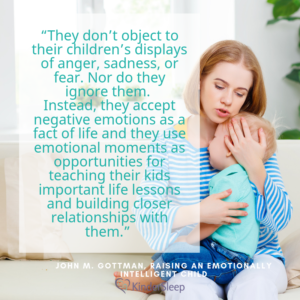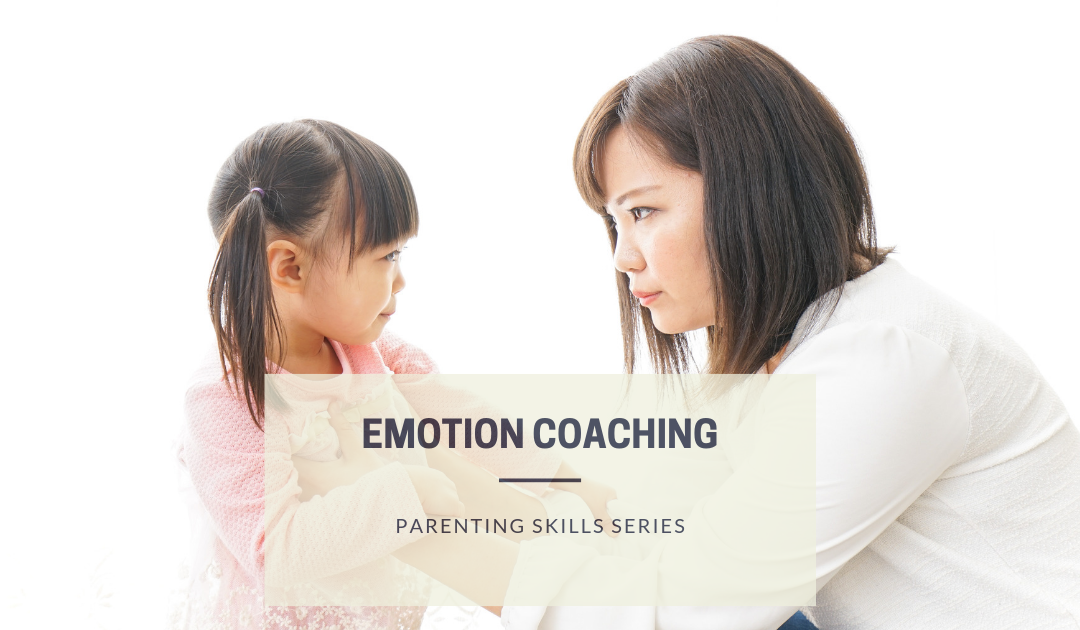Let them Feel the Feels - What is Emotion Coaching?
Emotion coaching is a parenting strategy that helps children develop emotional intellegence. It respects children's emotions and helps them feel heard and understood so they can learn to regulate their emotions. It also strengthens family relationships. The strategy is highlighted in John Gottman's book Raising an Emotionally Intelligent Child (Gottman 1997.) With emotion coaching, children's feelings are respected and validated, yet limits are set on behaviours. So it is not simply, I understand you don't want to brush your teeth, therefore you don't have to. Rather, the child's feelings are acknowledged and validated, and teeth brushing is kindly enforced.

This clip from the movie Inside Out, provides an example of how effective emotion coaching can be. Feeling negative emotions such as sadness, helps to process the experience, grow from it, and it ultimately builds resiliance and emotional maturity.
Dr. John Gottman explains it as "Helping children and young people to understand the different emotions they experience, why they occur and how to handle them." (Gottman 1996)
Emotion Coaching teaches empathy and is a powerful way to connect with others and regulate emotions. It can be used with children and adults to increase connection and love.
Through support from a sensitive adult, children can learn to process their emotions and helps cognitive and intellectual development.
5 Steps of Emotion Coaching
- Notice child's emotions - Listen to your child and try to understand feeling
- Help to feel understood, compassion, validated. Validate child’s right to have feelings.
- Put their feelings into words - verbally label feeling
- Help understand feeling and where it comes from
- Set limits on misbehaviour – feelings are acceptable, but misbehaviour is not acceptable.
Learning to coach children through their emotions can be challenging at first, especially if we as parents are not in tune or comfortable with our own emotions. Try to practice these steps when the stakes are low, when you are relaxed and enjoying a positive moment with your child. Practicing it in the easy times, will mean that it comes more naturally in the moments when you really need it. Emotion coaching helps children develop emotional intelligence, connection and resilliance and will have life-long benefits for them, and later, there own children.
Getting Cooperation
"Connect before Direct"
A powerful bonus of emotion coaching is that it creates a deep connection that helps children to naturally want to cooperate, as long as a connection is made before the adult makes any requests for behaviour. When children feel loved and connected, they have an increased desire to follow the examples and directions of those that they are connected to.
"Counterwill"
On the contrary, when there is no connection before we make a request, children (and adults too) naturally want to resist the action. This activates their counterwill, which is more likely to elicit the opposite response. This is a concept introduced by Gordon Neufeld, in is book, "Hold On To Your Children."
With this in mind, Emotion Coaching makes parenting children easier. In this video clip, Neufeld answers the question, what makes a child easy to parent? He describes the characteristics of an easy to parent child, and shares that its not due to skill, luck, love or care of the parent to the child. He shares that "It's not the love of a parent for the child, the key for the ease of parenting is the love of the child for the parent." When child feel understood and validated, it increases their connection and love for the parent, which has the biggest impact on the child following their parent's guidelines and leadership. (Neufeld & MATE, 2019)
More Resources on Emotional Coaching
Dr. Gottman shares the 5 steps to Emotion Coaching
This video from Circle of Security discusses how parent's emotions and history of negative experiences and perceptions of feelings can make emotion coaching more challenging and offer tips for overcoming these challenges.
Being-With and Shark Music -- Circle of Security International from Circle of Security International on Vimeo.
Resources
Gottman, J. (1997) Raising an Emotionally Intelligent Child. Simon & Schuster, New York.
Neufeld, D. G., & MATE, D. G. (2019). HOLD ON TO YOUR KIDS: Why parents need to matter more than peers.: VERMILION.
Circle of Security International https://www.circleofsecurityinternational.com/


